I am nothing
I shall always be nothing.
I cannot help but to be nothing.
That apart, I have in me all the dreams in the world.
-
The Tobacconist, Fernando Passoa,
Flying back to Brooklyn, Lisbon is with me. It flows through my mind, my thoughts, my
dreams, the poems of Luis de Camoes, Cesario Verde, Mario D Sa Carneiro,
Florbela Espanca, and Fernando Pessoa sitting in the book in front of me, the
images of the city, the people I saw leaning out of the windows of the # 28 tram careening through the ethereal
streets, looping us out through the city the
night before.
The birds flew through the street as we left, the sun
rising, greeting the day, as we made our way.
A man stood peeing in the street; a woman walked smoking a
cigarette. Empty beer bottles sat by a
park bench in the square where I sat just a few hours prior. The city just beginning to awake, sea water
sparkling in the distance. And I knew I would leave her.
A sea gull sat on a statue looking out at a plaza connecting
a maze of oblong streets, absent a sea of Starbucks chain stores, its labyrinth
only disconnected by an earthquake which broke the old city wall, disrepair,
repair, introducing a linear grid to streets, strewn with graffiti, pink and
white, yellow and blue tiles adorning this European capital of a land whose
empire once extended across the globe.
My mind rushes to the San Francisco quakes of 1906 and 1989,
the Chicago fire which tore apart the city, forcing it to repair itself. Great
cities adapt, melt into the air, and are reborn, over and over.
“We built our trams like yours from San Francisco,” noted
the waiter last night. “But ours are not
quite as open as yours. You enter in the
front. We have walls.”
“We love your city,” I explained. “Beautiful.”
“We discovered four continents, but now look at us,” he
lamented. “Look at us now. Nothing.”
There were people there doing just fine, before the
Portuguese came, in no need of discovering, I thought to myself.
I happen to like post empire Portugal a lot more than what it was. The empires of the world’s pasts are
blessedly, receding (the US included).
Instead, today Lisbon is rediscovering itself as a part of a
European economic community with any number of faults, as well as innumerable
benefits. A century after the “War to
End All Wars” its interconnections that make war feel futile, cannot be over emphasized. Sadly, the accompanying austerity measures,
loans and readjustments between a Europe
dominated by Germany and its partners limit the utility of this partnership. Nonetheless, this
small, somewhat peripheral nation in the Southwest of Europe manages to cling
to you. Kafka confessed of his Prague, “it gets
its claws in you.” Lisbon has the same feeling.
Today, Portugal offers a space for policy innovations .
Today, Portugal offers a space for policy innovations .
Its forward thinking policies around drug decriminalization and the importance of health care rather than jails is a model for the world.
the Portugese model involves harm reduction, treatment and health care for drug users. Rather than punish those caught in the cross fire of the drug war, increase police powers, and criminalize poverty, this model takes away the root of the problem. The US, with its souring incarceration rates, could learn a thing or two from this approach.
the Portugese model involves harm reduction, treatment and health care for drug users. Rather than punish those caught in the cross fire of the drug war, increase police powers, and criminalize poverty, this model takes away the root of the problem. The US, with its souring incarceration rates, could learn a thing or two from this approach.
Looking out at the ocean in Lisbon, the sea of Portugal, I
feel every bit a part of this city and its Atlantic breezes, but alien from it,
apart and separated from this city straddling between its pasts and futures,
its melancholy and exquisite feeling, its violent history and its alluring
present, its impulse to lean backward while making its way forward. It connects
me with my Brooklyn’s tides somewhere out there crashing onto the shores of the
Coney Island of my mind and the sea mist I taste, blowing in from the
ocean.
Throughout our trip Dion read L’entranger.
Staring at the sea, I think of myself and the kids playing
along the waterfront, looking just like the kids back home in Brooklyn Bridge
Park. I wonder how their summer had gone, between the shootings, assaults, and
political inanities and violence that is the us. I remind myself, we are a part of all of this,
connected by the sea, economics, global capital, history and separated by an ocean.
Staring at the sea, I think of the stranger.
Mario de Sa Carneiro killed himself at the age of 25. He wrote about “the other.”
Mario de Sa Carneiro killed himself at the age of 25. He wrote about “the other.”
“I am neither myself nor the other,
I am something in the middle
Holding up a
bridge…
That extends
from me, right to the other.”
In Lisbon, just as in Brooklyn hopefully that bridge
continues to extend “from me, right to the other.”
We wandered aimlessly most of the last afternoon in Lisbon,
more intrigued with each street we traversed.
Inside a gothic church, Joan, our trusty tour guide/ tuk tuk
driver, who’d been whisking us through the corridors of ever connecting streets,
asked if we came to churches such as this much.
“Sometimes, but I am an anarchist.” I confessed. “I love the art inside. Mom’s an art historian. So the gothic churches mean a lot to me. But the history is very very messy.”
He smiled.
“I like you guys. I
am going to take you to some extra places.”
So we lurched through his town, listening to music by street musicians,
hanging out in ancient trees, looking at the hills overlooking this
heartbreakingly beautiful city.
“To think about god is to disobey god,” declared Lisbon’s
most fabled poet, Fernando Pessoa.
“for god desired us not to know him
And thus he hid away from sight…
“So let us be as simple and tranquil,
As the streams and trees,
And God will love us for being so, and make us as beautiful
as they,
And give us the green of springtime,
And a river to go to at the end of days.”
Pessoa’s words seem to echo Alfred North Whitehead’s
modernist existential theology, which suggested that none of us could ever
know god as god was unknowable.
But we can feel a sense of awe. This sublime is one I have always tried to
see, hoping to feel. Standing in Santa Maria Novella, the old cathedral in
Florence, I felt that years ago.
Smelling the incense, the site of light through the stained glass, hearing the
songs. Seeing the evening light in
Lisbon, I felt it.
We’d traveled for weeks and weeks, enduring bed bugs and
hives, sleepless nights and enjoying laughter at communal meals, walking
hundred and hundreds of kilometers on our way to Santiago, where we reconverged
within the roving city of friends of the camino. These were people we hiked with, kvetched with,
and celebrated the song of the road and ourselves along the way. We would not make it to Finisterre, the
Spanish beach town, dubbed “the end of the world” as many of our camino friends
planned to. But we were done. The camino left its lessons and scars. We completed the last hundred k in three days
and the family was exhausted. The meeting in Santiago with all the Sweedish
Shepards who had completed the Porto to Santiago way was a celebration for the
ages.
But there would be no more hiking for us this trip. After a couple of days in Santiago, we’d make our way to Porto, where the city came as a surprise. Its hard to describe how beautiful is this waterfront village was to us.
 |
| scenes from porto |
After a few days there, we made our way south, stopping for
a few days at the Guincho guest house, a lodge in Areia, four k from Cascais,
just west of Lisbon. There we all
converged, between the water and the city, hanging out eating and playing cards, swimming, wandering through our little village, and playing
at the beach.
The Swedish, Princeton/Brooklyn, and St Paul Shepards, all connected one more
time. We cooked and ate past
midnight. Dr Smith, who mom went to
school with six decades prior, taught everyone hearts. We recalled past trips together to Macon
Village in France, La Foca in Italty, Maine, Sweden, Germany, Lake George,
Ireland, North Carolina, back to the South of France, and Portugal. The trips have never been simple. But when James and I joined the crew in the
Loire valley in 1998, there were no kids to speak of. Over the next 15 years, seven kids and two
spouses joined the yearly get togethers.
Most of the kids regard the Ireland and Sweden trips as the best of the
best. The grownups loved Italy. Everyone loved visiting mom’s childhood
vacation home in the Highlands of North Carolina, where we road tripped. Mom was sixty when we took part in the first
of these trips. Everyone can be seen
with a wine bottle in hand in most every shot of that French countryside, our
faces less wrinkled with age.
“Tempus fugit” Dr Smith mused when we talked about those
early trips and his observations of our struggles through childhood, travails
through high school, careers, bad grades, and the like. Time flies.
He took me to France in the summer of 1985 and we have been
buddies ever since (not that there were not occasional flare-ups over the
years). But the common stories of San
Francisco and Columbus, the shared affinities, meet ups for dinner in San
Francisco with Charles, Bill and Alfonso, stories about psychoanalysis and our
cities and childhoods continue to thrive.
He joined us on our 2004 trip to Italy, the first which
included mom’s grandkids, two from St Paul, one from Sweden, and another from
Brooklyn. Each subsequent trip would
include more as the family grew.
James was also along for those early trips. He’d join us as
well. The list of our yearly cities and
get togethers now includes: London, Paris, Berlin, Glasgow, Canterbury,
Manchester, LA, San Francisco, st. Paul and now Lisbon.
Dr Smith was with us when we first met James two decades ago
during a dinner at the Zuni Café in San Francisco.
Throughout the week, we talked and drank, took in museums
and shopping in Lisbon, and swimming along the beachfront.
The third day we journeyed for the first of several trips into Lisbon to the Gulbergian Museum with mom, dr smith, and number one.
Some nights we cooked at home; the last couple we enjoyed
out at restaurants, where we talked about the old trips, the camino, and the
our memories of trips which color the kids' childhoods. We recalled dad and where it began. We all
have to go back to the scene of the crime from time to time.
No one is sure there will be future trips with the whole
group. Every year it gets louder, the
kids grow bigger, and we get older.
“The spirit is strong, but the body…” noted mom after one of
the late evenings.
She comes alive when we look at art together, sharing
observations with number one, her grandchild from Brooklyn, now a teenager. That trip to Macon village feels like a long
time ago.
We all talked about dad at dinner the last night, gone
except for memories and stories, all of us aware this was is probably the end of
these moments, these dinners in points unknown from around the world. Other trips to Goa, Thailand, Ecuador, Peru,
Puerto Rico, China, Paris, river Thames london trail, Berlin and Sicily, they
would probably be on our own.
As the trip continues, we stay up later and later, playing
more and more hearts.
“You’re playing with the devil,” grandmom used to say when
we play solitaire.
Last night we stayed at Bairro Alto Hotel, just off the
Praca Luis da Camoes in Lisbon. We ate lunch on the roof. And walked through the afternoon.
Everyone seems to love Lisbon, but are also ready to go
home. So we walk and admire the quirky
streets, poking our heads in shops.
Caroline arranges a tuk tuk ride.
“What a city,” we exclaim, looking out from the plaza del
sol., talking to our tuk tuk driver.
“I am used to hearing Portugese from Bossa Nova.”
“It sounds so much better in Brazil,” noted Joan, our
amiable tuk tuk driver, who sometimes lets number two pump the engine.
“Have you been?” I ask.
“No, but its lovely there.
This language sounds like Russian,” he explains. “But we look at the
Atlantic Ocean and feel melancholy.”
“It looks like the end of the world,” caroline chimes in.
We listen to a guitar player in the square. Its our last day of touring and the panorama
of sites still seems to flash in front of my eyes. I snapped some shots of the colors and
trees, street and lights illuminating
it.
We stop at Portas do Sol, looking out at the city.
He shows us the old walls of the city and the church
destroyed by the earthquake.
We ride through an Indian neighborhood.
A man tries to swipe my phone. But I hold on. Feeling
connected and dislocated from the space, a kindred spirit with its poetic and
sensual streets and an awareness of our inevitable departure the next day.
I am of all the places I have been during this trip, acutely aware that I am apart from it, and separate.
“Nothing connects me to nothing,” notes Passoa in Lisbon
Revised (1926).
“I want dozens of things at the same time.
Anguished as if in hunged for flesh,
I long for something
Though I know not what it is –
Decidedly I am unsure
Turbulent in sleep and restless in dream.
Sleeping fitfully, dreaming in halves.
All doors denied, both real and imagined.
All curtains drawn tight, all speculations hidden from view.
I found the lane but not the door whose number
I’d been given.
I woke to the same life, a life I had slept.
Even the armies of my dreams conceded defeat.
Even my dreams believed themselves to be what they were not.
Even a life desired would give me no rest – even that
life...
My understanding is inconsistent, lacking focus;
I wrote and rewrite through lapses of fatigue;
And when my boredom itself begins to get bored
It drags me off to the beach.”
The view from the hills of Lisbon draws one’s eyes between
old streets and rooftops, birds flying about and that beach Pessoa reflected
upon below.
By the end of the journey, we find mom and Dr Smith enjoying Kir Royals at the bar. And we eat topas for a final, majestic meal
together. The kids from Sweden back
home, the St Paul gang teenagers now.
It’s a swansong for mom. And we
toast to her and all our trips. Everyone laughed, enjoyed topas, thanked mom,
and we walked home.
Finishing dinner, I wondered back up the hill to check out
Adega de Sao Roque, where we might have eaten.
Its thriving along with the rest of the city. The shepards from st paul say goodnight. And I wander for a tram ride
into the night. Everyone sticks their
heads out of the old street car careen through the city, ending at Martin
Moniz, off Rosio Square and the Praca de Figueroa, where the night just
continued and continued.
The kids are out. We
all walk, everyone walks, smiling, taking in the night, older having seen more
of this world and city.
Some drink beer and meet friends. Others wander to parties. Music screams from
the bars.
The college kids from the hostel hang out drinking cheap
beer in the plaza. I would have done the
same in my days romping about. I wonder
if my kids will come back on their own, to enjoy these adventures. Tempus fugit.
We are all strangers but a part of this multitude.
Its time to go home.
We land in Newark in just a couple of hours.
All summer long, we heard news about gun shots and violence, political stupidity, amnesia and challenges
few were willing to track in the US.


















































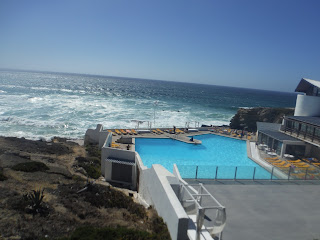



























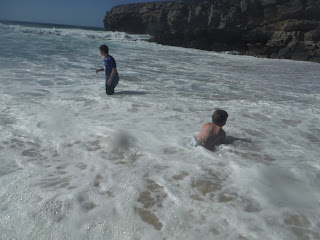













































































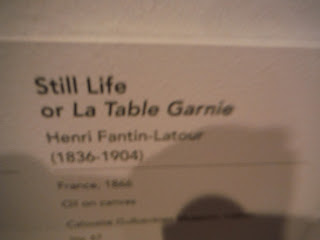































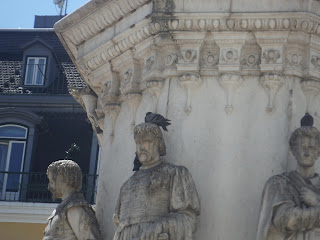


















































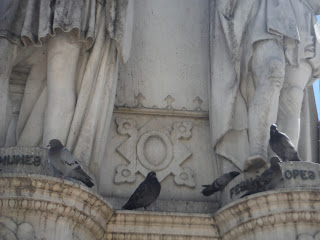


































































































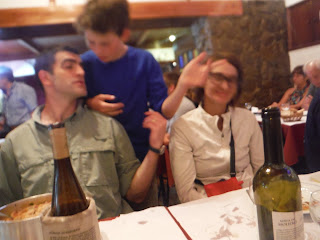





































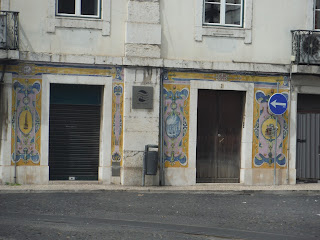














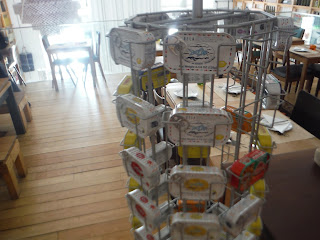




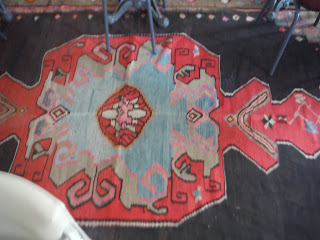












































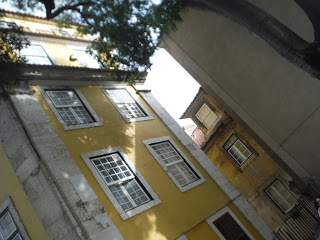





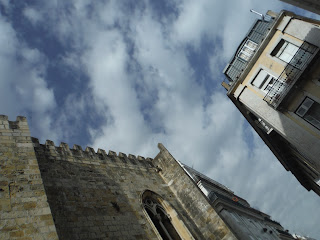




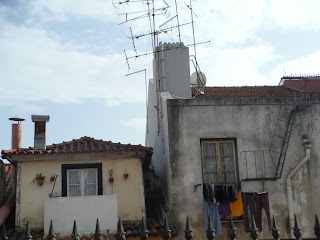

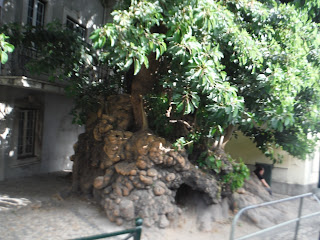


































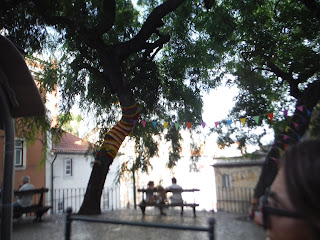













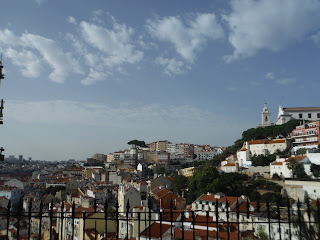

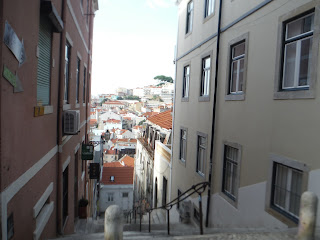






























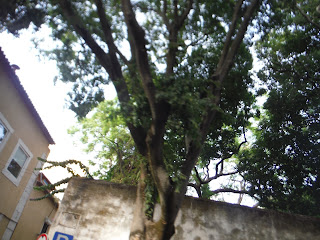

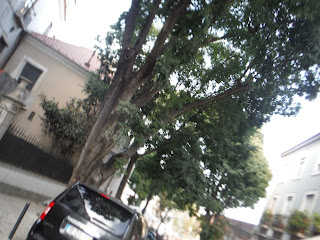

















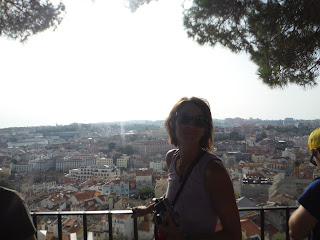
































































No comments:
Post a Comment